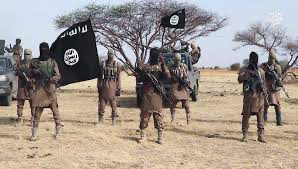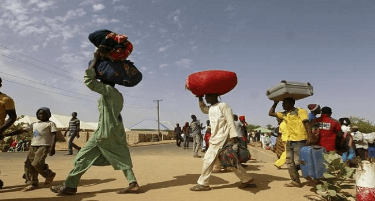Barely four days after the tragic killing of fifteen fishermen in the Tumbun Rogo community, the terror group known as the Islamic State – West Africa Province (ISWAP) has issued a dire ultimatum to residents of Kukawa Local Government Area (LGA), demanding they abandon their homes or face lethal consequences.
The gravity of the threat was brought to light by a resident who fled his community to Maiduguri hours after receiving the menacing warning. Preferring to remain anonymous, this individual recounted the harrowing experience to reporters. According to the resident, the terrorists convened a meeting of various community members early on Thursday morning. During this gathering, they issued a stark ultimatum: evacuate the area by Saturday, or be killed. The immediacy and severity of the threat spurred a mass exodus from the communities, with many residents fleeing to nearby areas such as Kross Kauwa and Monguno in search of safety.
Kukawa LGA, nestled around the Lake Chad basin, is renowned for its rich fishing and farming activities, contributing significantly to the local economy. The area, despite being under the protection of the Nigerian Army and Navy, has remained vulnerable to insurgent attacks. During the height of the insurgency, many communities in this region were displaced. However, under the administration of Professor Babagana Zulum, efforts were made to resettle these communities, including Kross Kauwa, Baga, Doron-Baga, Kukawa, and Tumbun Rogo.
The restoration of relative peace and stability in these areas has not completely eradicated the threat posed by Boko Haram and ISWAP terrorists. These groups continue to launch attacks, driven by the socioeconomic significance of the region. The fertile lands and abundant fishing waters provide vital resources that the terrorists explore for their survival and to fund their operations.

The recent threats reveals the persistent and pervasive nature of the insurgency, highlighting the ongoing struggle for control and the dire humanitarian impact on the residents. The terror inflicted by ISWAP and similar groups disrupts the livelihoods of local populations, forcing them to abandon their homes and means of subsistence. This situation poses a severe challenge to efforts aimed at stabilizing and rehabilitating the region.
Despite the presence of military forces, the insurgents have managed to instill fear and enforce their will upon the local populace. The ultimatum issued by ISWAP serves as a grim reminder of the tenuous nature of security in the area and the constant threat faced by its residents. As communities like Kukawa LGA grapple with the immediate danger posed by these terrorists, the broader implications for regional stability and economic recovery remain profound.
The local and national authorities face an uphill battle in ensuring the safety of these communities while attempting to dismantle the operational capabilities of the insurgents. The efforts to safeguard civilians and restore normalcy are complicated by the insurgents’ strategic targeting of economically valuable areas, which they exploit to sustain their activities.
In conclusion, the recent developments in Kukawa LGA reflect the ongoing challenges in combating terrorism in the Lake Chad region. The residents’ plight, marked by displacement and fear, calls for renewed and reinforced efforts to address the root causes of the insurgency and to provide lasting security and stability for the affected communities. The path to peace is fraught with difficulties, but the resilience and determination of both the local populace and the authorities remain critical in overcoming the terror that continues to plague the region.




